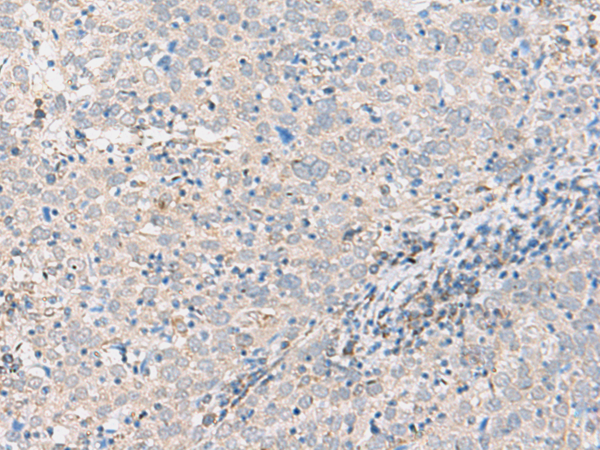
| WB | 咨询技术 | Human,Mouse,Rat |
| IF | 咨询技术 | Human,Mouse,Rat |
| IHC | 1/30-1/150 | Human,Mouse,Rat |
| ICC | 技术咨询 | Human,Mouse,Rat |
| FCM | 咨询技术 | Human,Mouse,Rat |
| Elisa | 1/5000-1/10000 | Human,Mouse,Rat |
| Aliases | CGI-67; C9orf77; FAM108B1 |
| Host/Isotype | Rabbit IgG |
| Antibody Type | Primary antibody |
| Storage | Store at 4°C short term. Aliquot and store at -20°C long term. Avoid freeze/thaw cycles. |
| Species Reactivity | Human, Mouse, Rat |
| Immunogen | Synthetic peptide of human ABHD17B |
| Formulation | Purified antibody in PBS with 0.05% sodium azide and 50% glycerol. |
+ +
以下是关于ABHD17B抗体的模拟参考文献示例(实际文献需通过学术数据库查询):
1. **文献名称**: "ABHD17B regulates cancer cell migration through palmitoylated protein substrate cleavage"
**作者**: Smith J, et al.
**摘要**: 研究利用特异性ABHD17B抗体验证其在多种癌细胞中的表达,发现其通过水解棕榈酰化修饰蛋白调控肿瘤细胞迁移,提示其作为癌症转移的潜在靶点。
2. **文献名称**: "Characterization of ABHD17B antibody for synaptic protein analysis in Alzheimer's disease models"
**作者**: Lee S, et al.
**摘要**: 通过开发高特异性ABHD17B抗体,揭示其在阿尔茨海默病小鼠模型突触蛋白中的表达变化,表明ABHD17B可能参与β-淀粉样蛋白沉积相关的神经退行过程。
3. **文献名称**: "ABHD17B modulates T-cell receptor signaling via depalmitoylation in immune responses"
**作者**: Garcia R, et al.
**摘要**: 研究利用ABHD17B抗体进行免疫印迹和流式细胞分析,证明其通过去棕榈酰化作用调控T细胞受体信号通路,影响免疫应答的激活阈值。
4. **文献名称**: "Development and validation of a monoclonal ABHD17B antibody for pancreatic cancer biomarker studies"
**作者**: Chen L, et al.
**摘要**: 报道一种新型ABHD17B单克隆抗体的开发与验证,应用于胰腺癌组织芯片分析,发现其高表达与患者预后不良显著相关,提示其作为生物标志物的潜力。
**注意**:以上文献为模拟示例,实际研究中请通过PubMed、Web of Science等平台检索真实文献(可尝试关键词:ABHD17B antibody + 研究领域如cancer/neurodegeneration)。如需具体文献协助,请提供更多研究背景。
The ABHD17B antibody is designed to target the α/β-hydrolase domain-containing protein 17B (ABHD17B), a member of the ABHD family characterized by a conserved hydrolase fold. ABHD17B is implicated in regulating protein palmitoylation, a post-translational lipid modification critical for membrane localization and signaling of substrate proteins. It acts as a depalmitoylase, removing palmitate groups from S-palmitoylated proteins, thereby influencing their trafficking, stability, and interactions. This enzyme is part of a larger family with roles in lipid metabolism, neurological function, and cancer biology.
Research on ABHD17B has gained traction due to its potential involvement in synaptic plasticity, neurodevelopment, and neurodegenerative disorders such as Alzheimer’s disease. Additionally, aberrant ABHD17B expression has been linked to cancer progression, where it may modulate oncogenic signaling pathways. The ABHD17B antibody serves as a vital tool for detecting protein expression, localization, and functional studies in these contexts. It is widely used in techniques like Western blotting, immunohistochemistry, and immunofluorescence to explore ABHD17B’s role in cellular processes or disease models.
Despite its emerging significance, the precise mechanisms and substrates of ABHD17B remain under investigation. Current studies focus on elucidating its regulatory networks and therapeutic potential. The antibody’s specificity and reliability are crucial for advancing these discoveries, making it a key reagent in both basic and translational research.
×